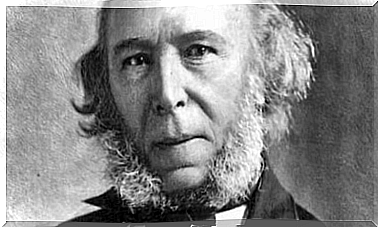The Eighth Habit: Listening To The Inner Voice

The Eighth Habit is a concept created by Stephen Covey, a business administrator and researcher, author of the famous book The Seven Habits of Highly Productive People . This is a mixture of psychology applied to the business and work world.
The eighth habit is a skill that goes beyond the other seven guidelines proposed by Covey and has to do with listening to the inner voice. For this author, it is a superlative ability, which leads each person to imprint a unique stamp on everything they do. That is why it places it outside of normal habits.
Listening to the inner voice means attending to what is most authentic in each one, regardless of what the dominant paradigms indicate. It corresponds to the most authentic part of each person and is the greatest source of creativity. That is why Covey considers the eighth habit to be an unusual skill.

The seven habits
Before we talk about the eighth habit, let’s mention the seven habits that Stephen Covey believes precede it. These are: being proactive, starting with an end in mind, setting priorities, thinking win-win, understanding before being understood, synergy, and “sharpening the saw.”
Let’s see briefly what each of them consists of.
1. Be proactive
Covey points out that proactivity is a way of acting in which a stimulus is responded to autonomously and without conditioning. In other words, it occurs when someone chooses to respond constructively , regardless of the stimulus they receive. It has to do with not holding others responsible for what each of us does.
2. Start with an end in mind
This habit refers to taking actions with purpose. This means not giving rise to actions that arise by impulse or chance, without a defined objective. In this way, each time an important decision is made, the key question will be whether it brings us closer to the goal or not.
3. Set priorities
It refers to the decisive fact of knowing how to discern the true importance of things. It is an essential skill and habit when it comes to managing time and energy. It is necessary to know what is important and what is not. In this way, effort is better managed.
4. Think win-win
Stephen Covey talks about “win-win”: he thinks that you only really win also when the other wins. This means that the decisions and actions to be chosen are those that best guarantee mutual benefit. Otherwise, an inconvenient imbalance is established in the future.
5. Understand before being understood
People, by waiting to be understood by others to act constructively with them, can reach a situation of total stagnation. The idea is to start with yourself and understand the other, since in this way you advance.
6. Synergy
Most large projects are only achieved with the help of the contributions made by many people. So it is essential to think in collective terms, if the goal is to achieve something great, lasting and positive for many.
7. “Sharpen the saw”
The metaphor of “sharpening the saw” has to do with the importance of going to the basics, to the origin. Before anything else, everyone has to take care of themselves and be in good physical and mental condition. No achievement is worth it, whether the price is wellness or health.

The eighth habit
Stephen Covey defines Habit 8 this way: “Find your own voice and let your voice inspire others to find theirs. ” Your own voice is the free voice of each person; the one that is devoid of conditioning or pressures and that expresses the most authentic thing that each one carries within himself.
Covey says that one’s voice leads to greatness and inspires others to achieve it as well. Such greatness is expressed concretely in three areas:
- Personal greatness. It refers to the application of the 7 habits, which, in turn, take shape in four great attitudes and virtues: vision, discipline, passion and conscience.
- Leadership greatness. Also derived from the 7 Habits, this greatness is expressed in seven ways: finding the path, creating the model, aligning, creating a technically flawless work system, unleashing talent, energy and contributions; and lead by example.
- Organizational greatness. An organization specifies its greatness in the mission, vision, and values it chooses as guidelines. When this approach is inspired by one’s own voice, it brings commitment, diffusion, synergy, and fosters reliability.
Stephen Covey’s work is one of the most famous in his area. His approaches have penetrated very deep in the organizational field. However, they are also applicable to personal and family life.









